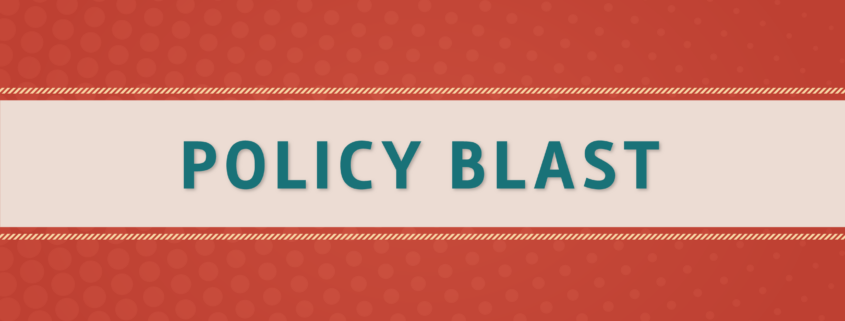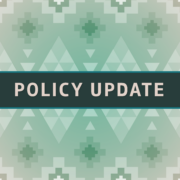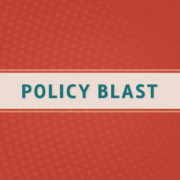Tribal Leaders Highlight Need for Increased Urban Indian Health Funding in Fiscal Year 2024 Area Reports
On January 26-27, 2022, the Indian Health Service (IHS) held their Area Report Presentations Webinar for Fiscal Year (FY) 2024 where Tribal leaders from 12 IHS Areas and leaders from three Native organizations, including the National Council of Urban Indian Health (NCUIH), presented on their budget requests. Many Tribal leaders spoke about the need to increase urban Indian health funding and establish designated funding for urban Indian health facilities and infrastructure. Many Areas also highlighted mental health and substance abuse needs, Health IT modernization, and permanent authorization of the Special Diabetes Program for Indians (SDPI). As part of the trust responsibility to provide health care to all American Indians and Alaska Natives, Tribal Leaders present their funding needs each year to the Secretary of HHS and the Director of the Office of Management and Budget. The recommendations are formed through the Tribal Budget Formulation Work Group and serve as a framework for the Administration in setting budget amounts for their annual requests to Congress. This process ensures the federal government has the resources to provide health care to all American Indians and Alaska Natives in fulfillment of the trust responsibility.
Tribal Leaders Highlight the Need for Increased Urban Indian Health Funding
Urban Indian health was a priority in the Area report presentations. IHS Oklahoma Area Representative and President of the Wichita and Affiliated Tribes, Terri Parton, advocated for $509.963 million in funding for urban Indian health, citing that “Although 78% of AI/ANs reside in urban areas, the IHS funding allocation for urban Indian health only reflects close to 1% of the total annual IHS budget,” and “There are inadequate levels of funding to address the rising urban Indian population.”
Several Areas featured the work of UIOs in their presentations and advocated for increased allocation of funding and resources for urban Indian health.
- IHS Phoenix Area recommended a $18.86 billion funding increase for Health Care Facilities Construction with $2 billion for urban Indian health facility renovation. The Phoenix Area Representative also highlighted that the urban Indian health program increase of $92.6 million identified in the FY 2023 budget recommendations remains a top concern in FY 2024, and recommended increased funding for Tribal and Urban Community Health Representative services.
- IHS Bemidji Area stressed that UIOs are underfunded and rely heavily on grants which can be unstable and recommended $477 million for urban Indian health in FY 2024.
- IHS Portland Area recommended approximately $1.8 billion in funding for the FY 2024 urban Indian health line item.
- IHS Tucson Area listed urban Indian facilities renovations in their top health priorities and Wavalene Saunders, Vice Chairwoman of the Tohono O’odham Nation, highlighted Tucson Indian Center’s collaboration with the Pascua Yaqui Tribe and Tohono O’odham Nation to address COVID-19 vaccine and testing efforts.
- The IHS Billings Area Representatives highlighted two Billings UIO success stories. Lane Spotted Elk, Councilman of Northern Cheyenne Tribal Council, highlighted the Billings Urban Indian Health and Wellness Center’s student mental health and suicide prevention efforts though collaboration with schools. The Indian Family Health Clinic’s food pantry efforts was also highlighted for receiving 5000 pounds of donated food and providing food boxes to patients, primarily seniors, during the pandemic.
NCUIH supports the average of the 12 IHS Areas recommendation of $1 billion for urban Indian health funding for FY 2024.
Meredith Raimondi, NCUIH’s Interim Vice President of Public Policy, presented the following urban Indian organization (UIO) funding priorities for FY 2024 during the Area Report Webinar:
- Urban Indian health funding amount of approximately $1 billion, which reflects the average of the Area budget formulation recommendations.
- Availability of funds for UIOs to spend on facilities and infrastructure needs (these funds would be exclusive to UIOs and would not impact the IHS facilities accounts).
- Behavioral health funding for UIOs.
- SDPI reauthorization and increase to at least $200 million.
- Community Health Representatives fund of $3 million for UIOs.
In addition to budget priorities, Raimondi highlighted several “hot topics” for urban Indian health:
- Safeguard IHS funding through advance appropriations and exception apportionment across the entire IHS/ Tribal/UIO system.
- Permanent increase in Medicaid dollars for Indian health through the permanent extension of 100% Federal Medical Assistance Percentage (FMAP) to UIOs and increased reimbursement rates.
- The American Rescue Plan Act authorized a temporary two-year extension of 100% FMAP to UIOs beginning April 1, 2021, however, UIOs have not received a single dollar of increased funding.
- Urban confer: establish a mechanism for dialogue and input between the Department of Health and Human Services agencies overseeing UIO programs and UIOs.
Next Steps
IHS will hold their FY 2024 National Tribal Budget Formulation Work Group on February 10-11, 2022. NCUIH will continue to advocate for $1 billion in funding for urban Indian health and increased resources for UIOs.









Leave a Reply
Want to join the discussion?Feel free to contribute!